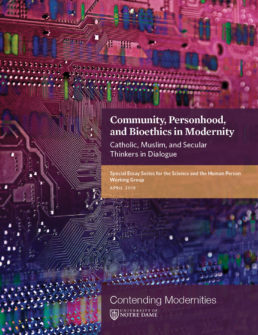Rapid advances in science and technology are raising fundamental questions about human life, flourishing, suffering, and death.
When does human life begin and deserve protection? How is deeper knowledge of genetics reshaping our conceptions of the human person? What does it mean to live and die with dignity amid 21st century medical technologies?
 These and other ethical questions at the intersection of science and the human person have a global character, encompassing all of humanity. They cut across national, cultural, and religious boundaries. But most efforts to address them have centered on particular communities, such as scientists and physicians, secular bioethicists, and religious experts drawn from the same tradition and often speaking only to one another.
These and other ethical questions at the intersection of science and the human person have a global character, encompassing all of humanity. They cut across national, cultural, and religious boundaries. But most efforts to address them have centered on particular communities, such as scientists and physicians, secular bioethicists, and religious experts drawn from the same tradition and often speaking only to one another.

The Science and the Human Person working group advances a global, interreligious and intercultural conversation about science, ethics, and the human future. Its activities will foster collaboration among secular scientific communities and the world’s two largest faith traditions, Islam and Catholicism, along with other secular and religious voices. We invite you to read our scholars’ blog posts about their research here.
This working group is carrying out two connected projects, each linked to a fundamental question.
Engaging Tradition: How can Catholic, Muslim and secular actors and institutions work together constructively to engage the key scientific, technological, and ethical challenges of modernity?
Informing Public Discourse: How can shared perspectives on the human person, developed through dialogue across religious and secular lines, better inform public discourse on the governance of science and technology?
